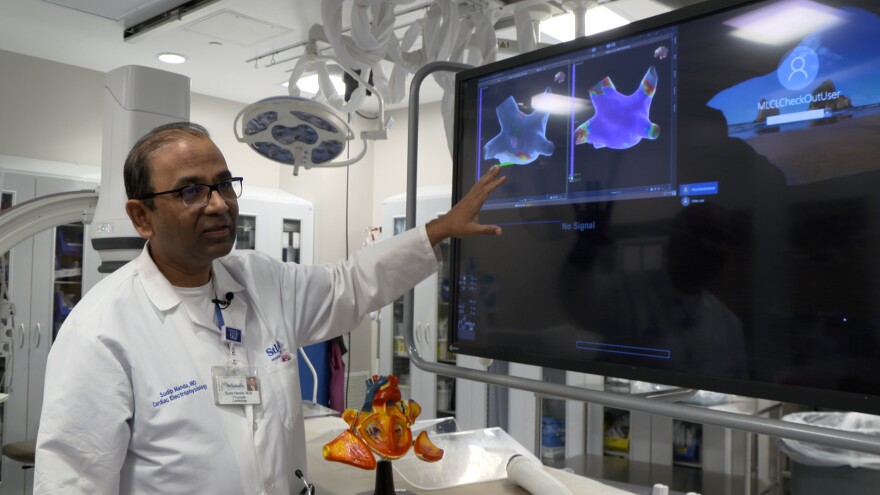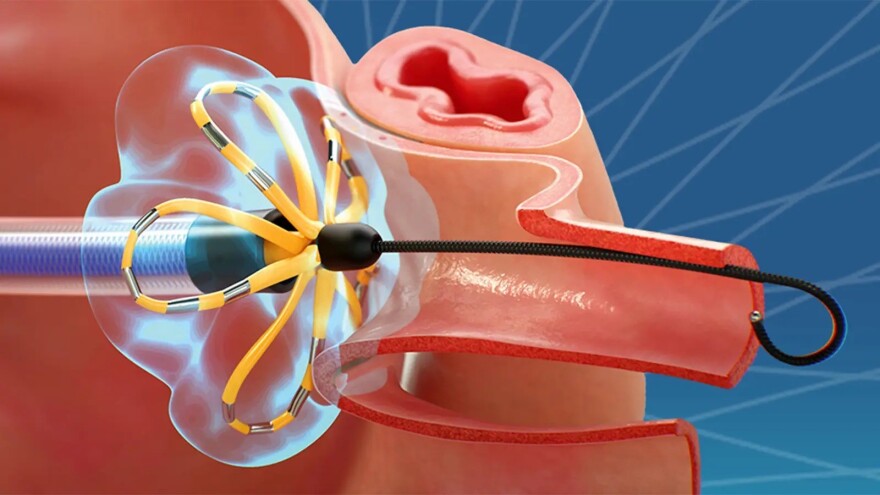BETHLEHEM, Pa. — New cardiac technology is in place at an area hospital working to improve patient safety and recovery times.
St. Luke’s University Health Network recently was among the first hospital systems in the area to introduce the updated procedure to treat atrial fibrillation, or AFib.
"It's like your heart is running a marathon. My heart would pound or race and I noticed it moreso at night and especially when I was going to bed."Rae Temples of Mount Bethel, who suffers from AFib
"It's like your heart is running a marathon,” said Rae Temples, 57, of Mount Bethel, who suffers from AFib.
"My heart would pound or race and I noticed it moreso at night and especially when I was going to bed. I could feel it. Some people cannot, but I know when I'm in it and it's not a good feeling."
Temples, a kindergarten teacher, underwent a cardiac ablation in January using the older technology, in which doctors freeze a section of the heart to correct the heart rhythm.
"It really didn't do what it should have,” Temples said.
She recently found herself back in the operating room for another ablation, but this time with the new technology, a pulsed field ablation.
"Between the two procedures, the newest one is definitely more appealing and the way to go," Temples said.
New technology
A pulsed field ablation is used to treat heart conditions including one of the most common, called Afib, which is when a patient has a fast heartbeat.
"If you have a slow heart rate, you need something like a pacemaker to help your heart," said Dr. Sudip Nanda, a cardiologist with St. Luke’s University Health Network.
"If it is a fast heart rate, you can do either medication to slow it down, or what we call ablation.
"Ablation means you go inside the heart with different catheters, you map the heart and find out what the abnormal circuit is.
"And then once you have identified whether it is one source or a full circuit, you can either burn it or freeze it and take care of the abnormal circuit and then your heart goes back into its normal rhythm.”

Nanda is among five St. Luke’s electrophysiologists who perform ablations at the hospital system's Fountain Hill location.
He said the old technology uses a straight catheter that delivers extreme heat or cold with a pencil-like tip, while the new technology uses a tool that can be formed into a basket or flower shape while in the heart.
“This new form delivers a pulse field," he said. "When you have a very high voltage — over 2,000 volts — and energy sparks, the energy goes into the cells which you want to affect and creates pulses within them.
"They become leaky, and then they die out.”
Less pain
Nanda said the new form is safer, faster and leaves patients with a less painful recovery.
"Traditional ablation involves ... radiofrequency, which is heat related. One is cryo, which is essentially causing frostbite,” he said.
"In both of them, you have to be extremely careful of injuring surrounding structures. Most common, the foot pipe which is behind the left atrium where you're ablating.

"If you do damage to it then there is a chance of a fatal complication.”
Nanda said there's also a chance of injuring a nerve that supplies the diaphragm or the breathing muscle, but that does not happen using the new tool.
Nanda said his patients often would wake up with severe chest pain and deep breathing, but that has changed with the updated procedure, as well.
"I don't have any heart pain or soreness like I did on the last one. I was able to, within limitations obviously, go back to what I was doing and really didn't notice side effects like I did with the other.”Rae Temples of Mount Bethel, who suffers from AFib
"I don't have any heart pain or soreness like I did on the last one,” Temples said. “I was able to, within limitations obviously, go back to what I was doing and really didn't notice side effects like I did with the other.”
The St. Luke’s team studied the new form of cardiac ablation for the past two years before investing in the technology and using it over the past month.
Nanda said the other types of ablations still will be needed in some cases, but the new one will become the primary way to fix the heart condition moving forward.
Lehigh Valley Health Network is also offering this new technology for irregular heartbeat as well.


